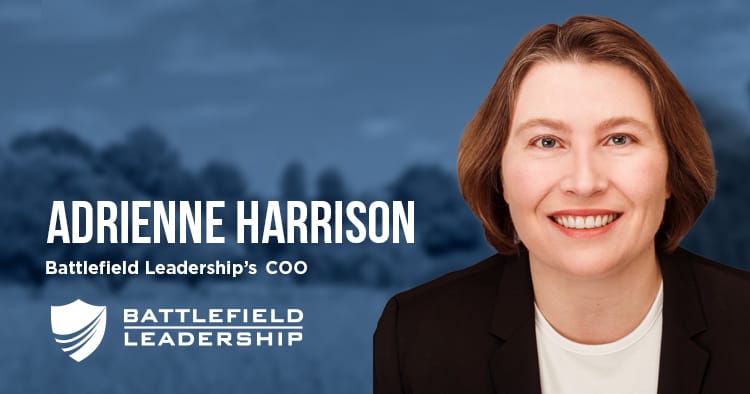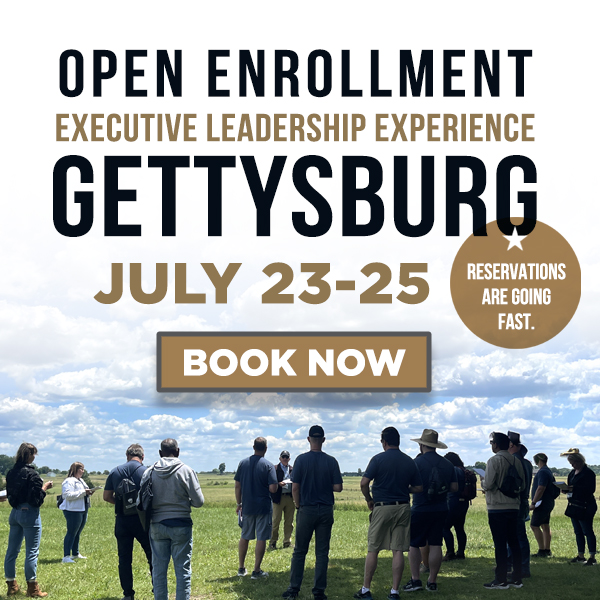

The beginning of a new year often ushers in renewed focus and strategic change for many organizations. Battlefield Leadership is no different. The company recently hired one its highly lauded senior facilitators, Adrienne Harrison, Ph.D. as its new Chief Operating Officer. Her credentials and achievements are nothing short of remarkable.
For more than twenty years, the West Point graduate and decorated Army veteran has led organizations both in and out of uniform. While in the Army, she served as a multifunctional logistics officer in a variety of leadership positions across three combat tours in support of Operation Iraqi Freedom. She played an integral role in the Army’s change management process, transforming the way logistics and life support operations are conducted on the battlefield. She subsequently served as an assistant professor of American history at West Point. After concluding her Army service, she entered the corporate world and held several executive roles before coming to Battlefield Leadership full time as its COO.
What are you most looking forward to in your new role?
Working alongside our CEO, Kevin Farrell, helping him set the strategy for the company’s operations and growth, ensuring peak performance, and driving results while fostering a culture of continuous improvement across all facets of the organization.
Now that most industries are coming out of COVID, my goal is to expand our client base and focus on how Battlefield Leadership will continue to grow. While I am transitioning from a senior facilitator to COO, I am excited that I still get to use my diverse career in the military and teaching history at West Point to take on content development for our programs.
What do you have your sights set on?
We are putting COVID in the rear-view mirror and 2022 is our year of emergence from it. We are looking at how we can better position Battlefield Leadership than we were before, how many more programs we will facilitate, keeping an eye on year-over-year growth and setting 5–10-year goals.
A lot of your customers can relate to that.
Everyone did what they had to do to get through year two of the pandemic. We at Battlefield Leadership recognize that many organizations aren’t bringing every employee back to the office like it was pre-Covid; this puts more emphasis on making those times when teams do come together really count. Battlefield Leadership is ideally positioned to help leadership teams make the most of those gatherings.
The proliferation of the remote or hybrid workforce creates new leadership challenges in a more dispersed environment. How do you manage a team and hit productivity goals? Virtual meetings enable us to see each other, but it is still a struggle for some. However, when you reflect on history, most leaders did not see their direct reports every day. The lessons of history underscore the need for solid corporate leadership and leadership training to help organizations be stronger in the end, despite the impacts of distance in a more remote work environment.
How has onboarding new Battlefield Leadership team members changed? What recommendations do you have for other organizations?
My plan is to take a more personal approach. One thing we’ve learned in our work with clients is how important it is to ensure that remote workers truly feel like a part of the team. When employees have left, one of the reasons they give is that they felt cut off from everyone and missed that interaction. You must guard against that, and if not, you are going to lose them.
What remains consistent is making sure to clearly communicate what is expected of them and periodically asking them if I have set them up for success. You must build trust between you and your team to let them do their jobs. History is so useful in this regard because it wasn’t too long ago that you trained people and let them do their jobs without hovering because we did not have the same means of communication as we do today.
Why should organizations look at Battlefield Leadership now?
Every business coming out of the pandemic is facing some sort of new normal, whether that means changes to consumer buying patterns, how people communicate, people’s willingness to travel, or some other factor. Whole new industries have been born from being forced to look at and do things differently because of the constraints the pandemic placed on us all.
The common factor is going into the unknown, in a direction you perhaps didn’t anticipate. Where history gives leaders a good measure of comfort is when you play the tape to the end, you can assess the second and third order consequences on decisions. Leadership lessons don’t change, circumstances do. They realize that they are not alone – they see the same types of challenges, emotions and conflicting arguments have all been played out. Being able to understand that and play in context builds strength.
For those who may be leading in ambiguity and are uncertain of what lies ahead, it is the perfect time to reach out to Battlefield Leadership. We are excited to get back to work to help organizations successfully navigate challenging times ahead.
Through our unique programs, leaders from Fortune 500 companies, government entities and higher education institutions learn how to overcome these challenges and transform their organizations, positioning them for future successes. Find out how Battlefield Leadership can help yours by emailing info@battlefieldleadership.com or by calling 864.386.9637.

